‘It will always haunt me’: I watched my fiancee die during childbirth
He lost his fiancee during childbirth, becoming a father and losing the love of his life on the same day. Now Wayde Kelly opens up about how he survived that devastating loss and found love again.
QLD News
Don't miss out on the headlines from QLD News. Followed categories will be added to My News.
The day before the birth of his first child, Wayde Kelly looked at his fiancee, blooming and beautiful, and felt something close to perfection.
A new stage of his life as a family man, a new dad and a husband-to-be was before him. He couldn’t wait to meet their baby and marry Kymberlie, his vibrant, big smiling, dancing, girl of his dreams. But, in a devastating twist, a very different path was to unfold.
During the birth of their beautiful son Kyden, Kymberlie Shepherd, a healthy 26-year-old teacher, who was dancing her way through labour, who dealt with the pain of childbirth by laughing, who had no prior warning or reason to expect a complication, suddenly suffered a rare amniotic fluid embolism (AFE).
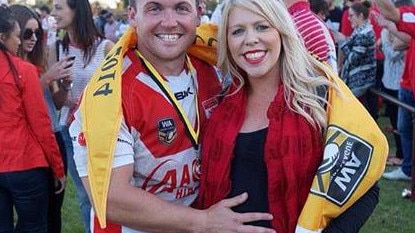
In an unspeakable tragedy, Shepherd, who had no previous medical conditions, was unable to be saved. She died on the same day, in October 2014, that her son was born.
In the dark and tremulous months following Shepherd’s death, Kelly, then 26, battled grief and trepidation about his sudden role as a single, “underprepared’’ first-time dad.
Kelly and Shepherd, who met on the Gold Coast, were living in Perth when Kyden was born.
After the tragedy, Kelly was embraced by a care army of family and friends. He brought his baby son back to his childhood home of Ocean Shores, in northern NSW, to live with his Nanna, Fran, who, with his mum Keri provided guidance and support.
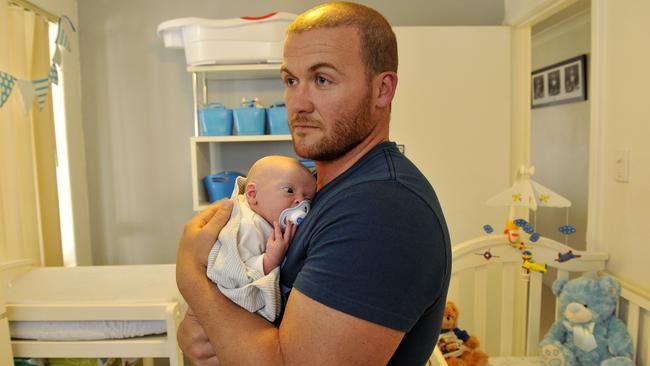
Kyden is now a happy, healthy seven year old who has plenty of reminders of his vivacious mum.
And in a new, heartwarming chapter, Kelly, 34, a northern NSW zone manager for the National Rugby League, has found love again, with Sammy Stewart (now Kelly), 31, an Ocean Shores local.
They married in November 2020, in between Covid lockdowns, after welcoming their baby son Koa earlier that year.
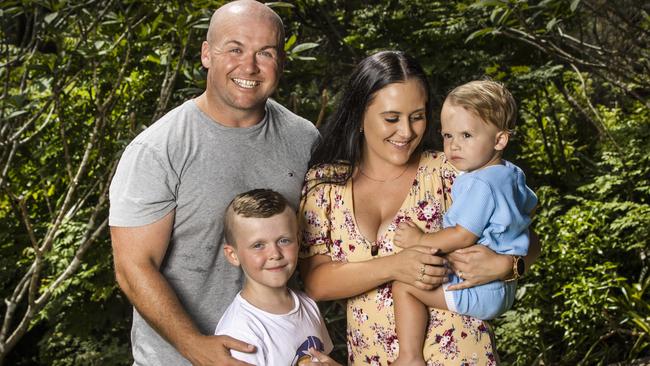
Kelly, who continues to promote awareness and further research into AFE, says he will always be haunted by what happened but has tried to “channel my inner Kym’’ to ultimately become a better person.
“I have learnt a lot from what happened about people, about grief, about life,’’ Kelly says.
“While it will always haunt me – watching your fiancee pass away while she is holding your hand isn’t something you can ever un-see – going through the whole process has made me a better person in a number of ways.
“We saw thousands of people reach out to help support and provide well wishes, which makes me think better of people.
“As a dad I was underprepared, so I’m now more prepared for anything I commit to.
“And I never judge people’s circumstances. You just don’t know what they have gone through.’’
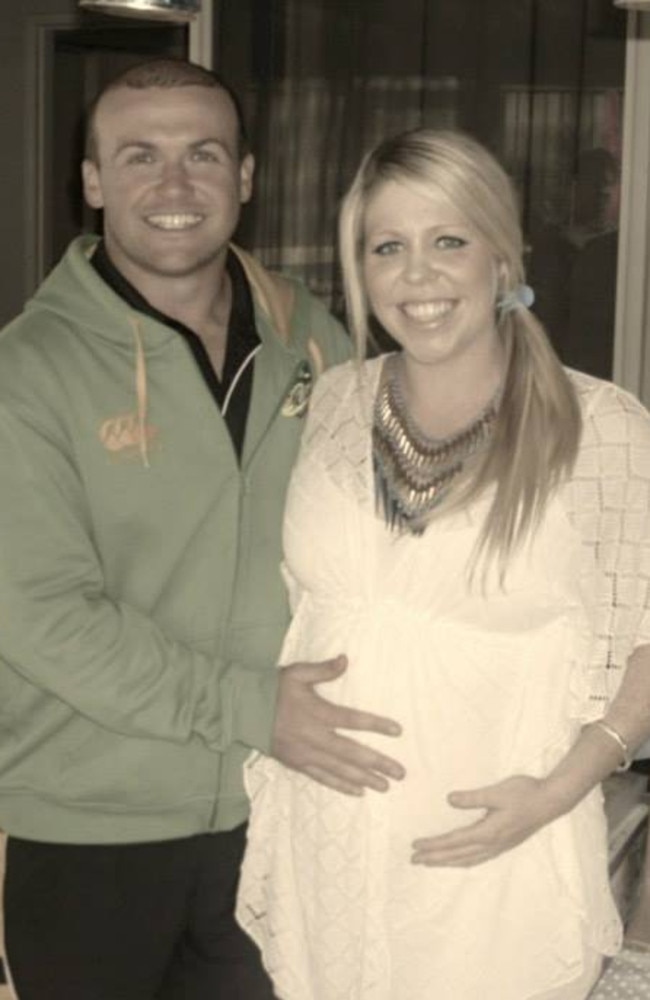
AFE is a life-threatening birth complication that can affect both the mother and baby. It is not fully understood but it is thought to be the result of an allergic-like systemic inflammatory response to amniotic fluid entering the mother’s bloodstream, which may occur as part of the birth process.
Serious and life-threatening complications include cardiorespiratory collapse and severe bleeding called Disseminated Intravascular Coagulopathy, or DIC, that affects the body’s ability to clot and stop bleeding.
Early symptoms may include skin discolouration, shortness of breath, chills, confusion and abnormal vital signs, with other serious complications including seizure, loss of consciousness, stroke and brain damage.
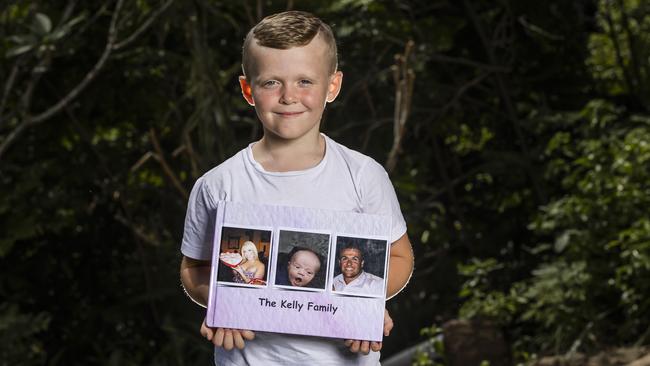
The baby, if delivered after the mother exhibits symptoms, is also at risk of becoming distressed due to decreased oxygen supply.
The American-based AFE Foundation, founded in 2008 by Californian-based AFE survivor Miranda Klassen, is an international network of those affected by AFE. A primary objective is to better understand AFE causes, establish more effective treatments, as well as a way to predict, and a “gold standard diagnosis’’.
It’s AFE Patient Registry, the world’s largest database of AFE cases, now has at least 250 submitted cases.
Ultimately, it aims to advance research of AFE and better understand its causes.
“AFE remains unpreventable and poorly understood. Mothers and babies are still dying,’’ the AFE Foundation website states.
“An amniotic fluid embolism is extremely difficult to treat and considered one of the most fatal birth complications in the world.’’
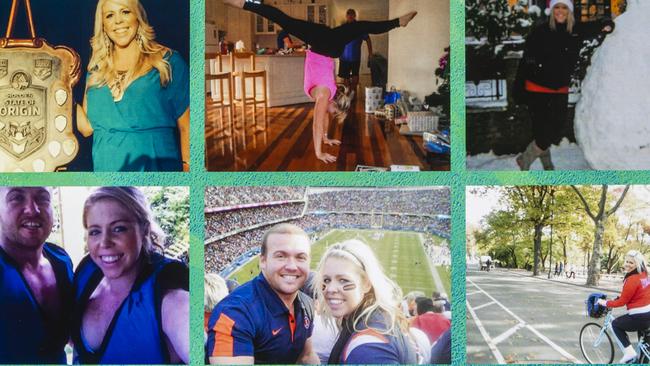
Maternal fetal medicine specialist Dr Scott Petersen, who works out of Brisbane’s Mater Hospital, says the condition is rare, affecting somewhere between two and six women per 100,000.
There are different degrees of AFE and, while each case is different, usually all are sudden and unexpected.
“I don’t know whether we’ve ever actually got a complete grasp on it,’’ Petersen says.
“It’s one of those things we never want to have happen. We have little way to adequately predict who will be affected, and it’s difficult to study because the incidence is so low.
“It can be devastating. Sadly, I don’t think there’s any way to prevent it other than by having staff keeping up to date with basic life support and responding to a maternal resuscitation need.
“There can be quite a variety of presentations. It’s a bit like, if we use the example of Covid, it’s hard to predict who’s going to have a really significant form of that.’’
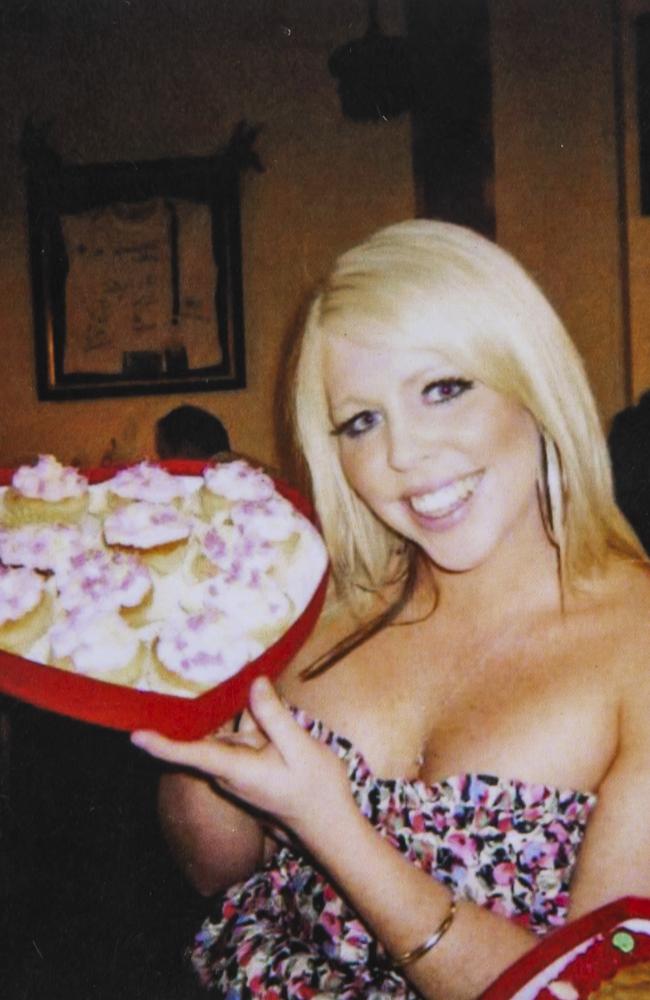
Kelly and Shepherd were together for six years.They met at the footy, when Kelly was playing for the Burleigh Bears U20s and Shepherd was friends with one of the players. They crossed paths again at Griffith University on the Gold Coast – Shepherd was studying teaching and Kelly sport management followed by a graduate diploma of education.
After finishing their degrees, they embarked on the great young Australian adventure of moving to London for two years, working and travelling.
On their return to Australia at the end of 2011, they moved to Perth, Kelly taking up a job opportunity at the NRL in development work in the city.
Shepherd found work a half-hour south of Perth, as a teacher in the dance and cheerleading program at Safety Bay Senior High School. She also taught dance outside of the school, at Reflections Academy of Dance.
They settled into life in a new state, with Shepherd, the “glue’’ of their social circle, who made friends easily, with big networks of friends wherever she went.
In April 2013, they bought their first home – a three-bedroom brick home on “a decent size block’’ – at South Lake, a nice halfway point between their two workplaces.
Then in late December that year, Kelly woke Shepherd up early to climb Mt Warning/Wollumbin, near Murwillumbah, to watch the sunrise. At the top, his marriage proposal included the “corny’’ line of, “You make me feel on top of the world’’.
A month later, on Kelly’s January 29 birthday, Shepherd told her now-fiance she was pregnant.
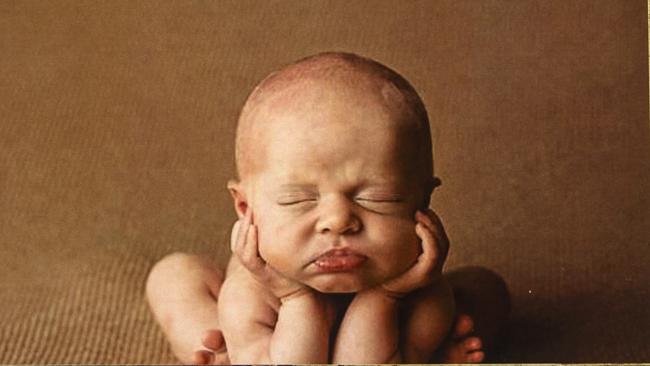
“Everything was coming together. We wanted stability before we had kids, to buy a house, to have permanent jobs,’’ Kelly says.
“We wanted to tick things off before we had kids, so it was good to be able to achieve those goals. We were pretty settled and happy.’’
Shepherd suffered morning sickness and vomiting during her pregnancy but, otherwise, it was medically unremarkable.
They did birth classes, the nursery was prepped and the name of Kyden – a mix of Kym and Wayde – was decided.
“Kym was very excited, she couldn’t wait,’’ Kelly says.
“She figured she was made to be a mum so it would all just happen pretty smoothly, I don’t think she had any concerns.’’
At 11 days past her due date, Shepherd was induced at the (now closed) Kaleeya Hospital in East Fremantle.
During her labour, Kelly says she was in “good spirits’’, laughing and dancing with her music on. Her mum Lianne had flown to Perth to be of support.
“Kymmie was laughing and dancing all the time,’’ Kelly says.
“She was moving around, she had her music on – she just liked something with a good beat that you could dance along to.
“Her method of dealing with pain was to have a laugh. Up to her last breath, she still had a big smile on her face.
“I literally turned around for a second to do something or get something for her – I can’t remember exactly what it was but maybe it was to change a song or pass the gas – and I turned back and she was having a fit. It was so quick.
“She started to lose colour but I still didn’t have any idea. I wasn’t ever thinking of a bad outcome.’’
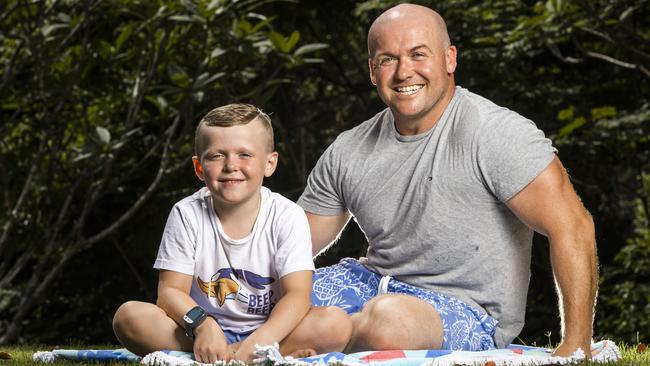
Then it is a blur. Kelly watched in alarm as a nurse jumped up on the bed and began chest compressions. He saw a flurry of medical staff rush Kymberlie away for an emergency caesarean section, all the while trying to resuscitate her.
Ushered into a private waiting room, Kelly and Lianne were told at 10.30am on October 16, 2014, that Kyden had been born and that Kymberlie had likely suffered AFE. Doctors were doing what they could to save her.
At 12.30, Shepherd, who never regained consciousness, was pronounced dead.
“I was in disbelief. I went in with a healthy 26-year-old fiancee and then something like this happens,’’ Kelly says.
“I’d never heard of AFE before that day. You just don’t think this can happen.’’
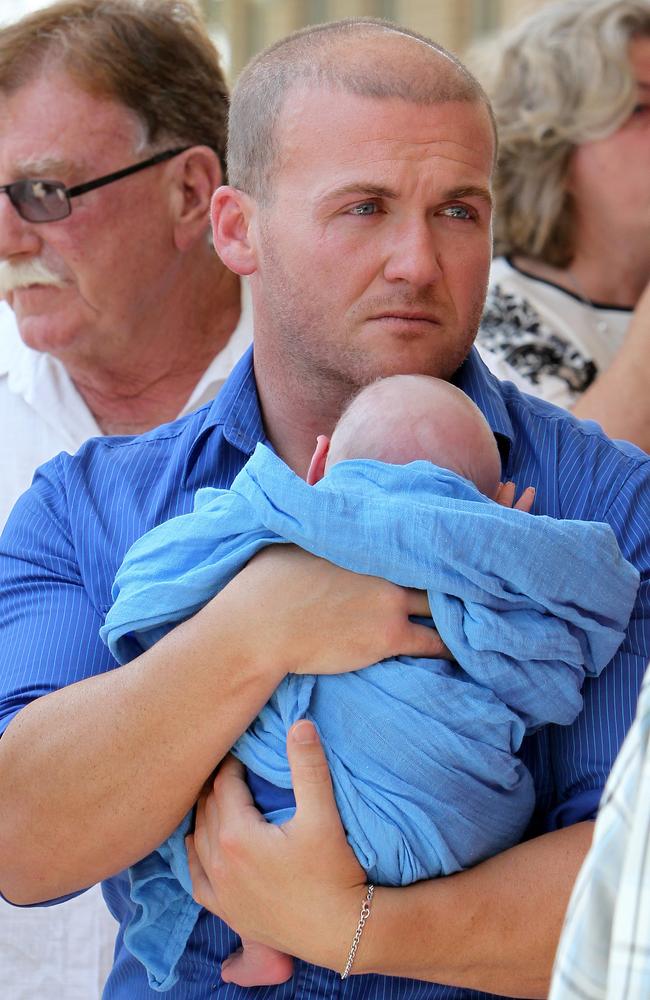
The weeks and months following Shepherd’s death are a blur of grief and shock as a memorial farewell was held in Perth, followed by a funeral on the Gold Coast. Kelly then began readjusting his life from the cross-country move from Perth to the Gold Coast and “trying to work out how a baby works’’.
In a precious book in Kyden Kelly’s bedroom, is the story of his family. Compiled just after his first birthday, there are photos of Wayde and the ever-smiling Kymberlie. There are photos of his parents exploring the world, going to the footy, snorkelling and having fun. There are pictures of Kyden as a baby and of Wayde holding his precious son.
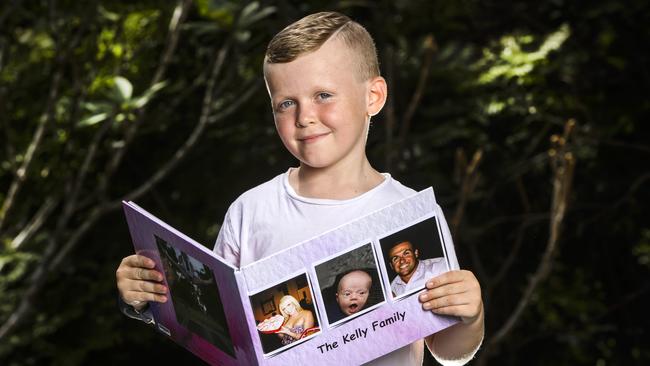
And then a page in Kyden’s book simply, heartbreakingly, states: “Mummy died in the hospital, so now there is me and Dad. We miss her heaps, everyone does.’’
It is a fine line that Kelly, who now lives at Nunderi, in northern NSW, must tread in talking about the trauma of losing Shepherd. It is, after all, Kyden’s birthday and he never wants his much-loved son to feel guilty for celebrating his life.
He also doesn’t want to “freak any pregnant women out’’ talking about a rare medical event that is statistically unlikely to happen. It is, he says, “a tricky one to navigate’’.
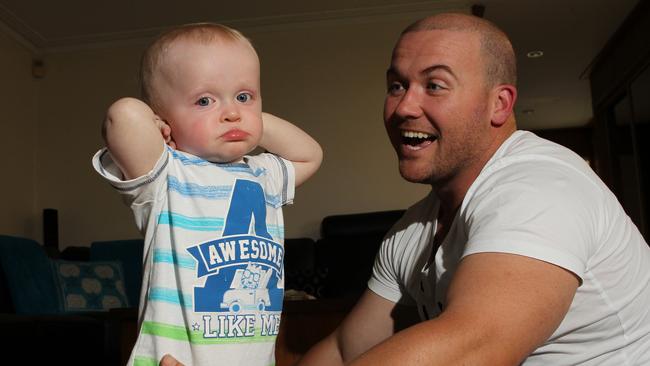
“For me, yes, it was really bad but I don’t want Kyden feeling bad and negative about it,’’ Kelly says.
“We never want Kyden to not be able to celebrate his birthday or have mixed messages or feelings.’’
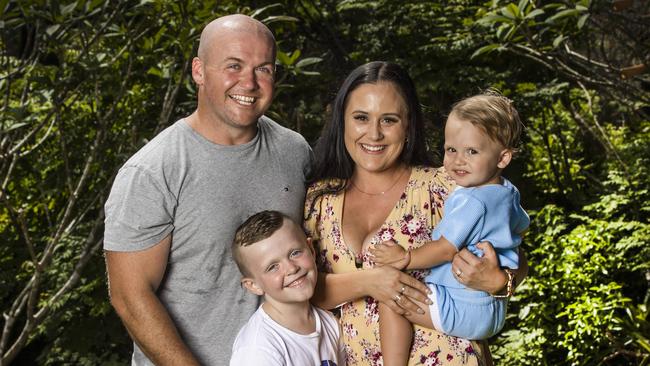
For a start, Kelly makes an effort to separate Kyden’s birthday celebrations from the anniversary of Kymberlie’s death.
The biggest “Kym-focused day’’ on their calendar has become her birthday, on April 3, when Kyden will pick her a birthday cake.
At the height of his grief, Kelly hit the gym as his “primary vice’’ and, now, on Kym’s birthday he will head to the gym early to clear his head. During the day, he will sneak in a Guava Cruiser (Kym’s drink of choice) and, if possible, play a social nine holes of golf. Sammy will usually send flowers to Kym’s mum Lianne.
After Kyden goes to bed, Kelly takes the time to go through some photos.
“We had been to so many places and achieved so much in a short period of time,
it’s always great to reminisce on how fortunate we were to be able to do the things we did,’’ Kelly says.
“Kyden will also light a candle for Kym on any special occasion or whenever he wants.
We make sure we read his book on Kym on these days. We’ve never tried to hide it or shy away from it. We have lots of support and everyone is pretty open to talking about her. It’s never off-limits.’’
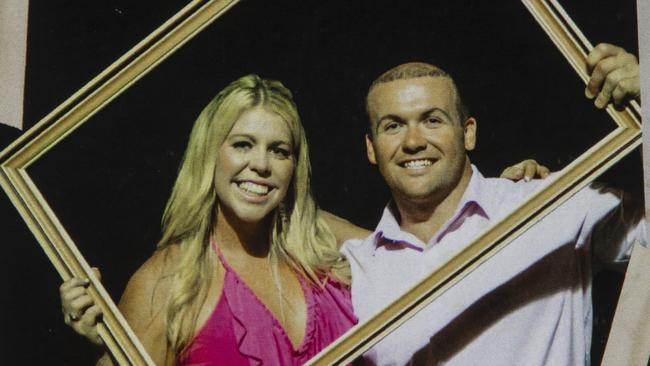
Kelly says he developed Post Traumatic Stress Disorder from the trauma of losing Kymberlie in such a sudden and shocking manner and still doesn’t like going to a hospital.
He had to confront this fear when Kyden required surgery for a blocked tear duct when he was four years old and he had to hold his son while he was anaesthetised. It was an experience he describes as “horrific from my end’’.
Tragically, Kelly has also experienced the sudden loss of one of his best mates, rugby league footballer Grant Cook, 28, who died on the field with him in 2016, suffering an accidental traumatic brain injury during a heavy tackle at Murwillumbah.
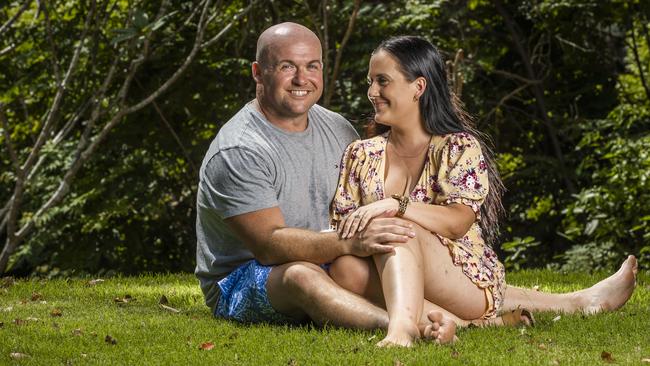
Kelly was, understandably, initially reluctant to have more children for fear of the birth, but “when you are with someone and love someone and they want to have a child, I understood’’.
Incredibly, Sammy also required an emergency caesarean for the birth of Koa after not progressing in her labour and the baby becoming distressed.
In a pre-planned decision in the case an emergency caesarian was needed, Sammy’s mum Katy swapped places with Kelly to be present at Koa’s birth, while Kelly was comforted by his mum in the hospital carpark.
“When I saw Koa and Sammy for the first time it was as much relief as anything,’’ Kelly says.
“The hospital is a trigger for me. I just don’t want to be there. But I have come to terms with what happened and I have plenty of coping mechanisms in place.
“I was super lucky to find Sammy. She is a truly special person.
“She has a massive heart and is so supportive, understanding and inclusive of what has happened. I don’t know what would have happened had we not met.’’
Despite the tragedy suffered, Kelly realises he is fortunate in more ways than one.
“Kyden is an amazing, independent and intelligent child who has so much love and support around him. He has a lot of people looking out for him,’’ he says.
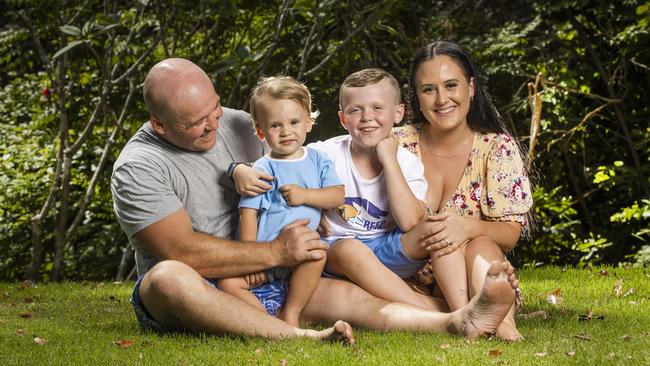
“While we will never make up for his mum not being around, we are lucky to have plenty of people who try.
“Kyden and I are in a better place than I ever thought could be possible. I’ve had other people go through stuff who don’t have the support or coping mechanisms.
“As bad as it has all been, I am very fortunate to have an amazing family, friends, support and the life that I do.’’
More Coverage
The smart way to keep up to date with your Courier-Mail news
Originally published as ‘It will always haunt me’: I watched my fiancee die during childbirth




